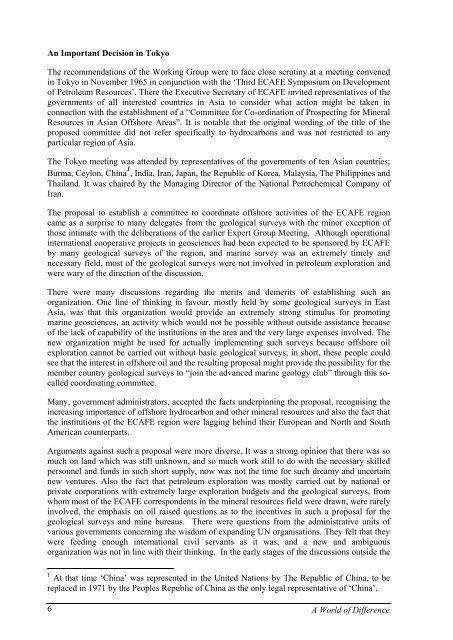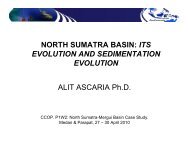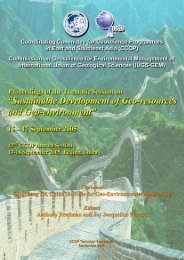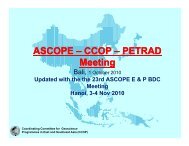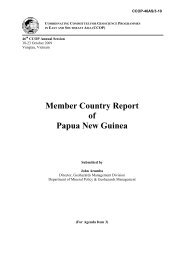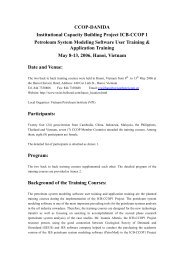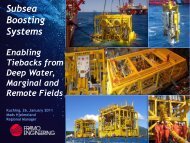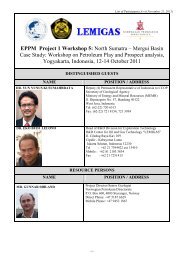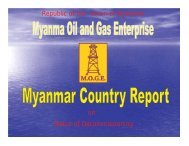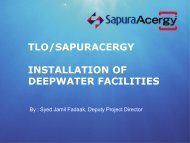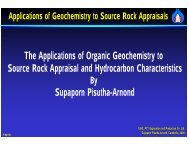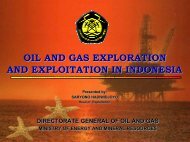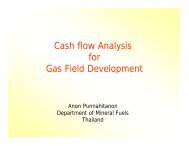Forty Years Of The Coordinating Committee For Geoscience - CCOP
Forty Years Of The Coordinating Committee For Geoscience - CCOP
Forty Years Of The Coordinating Committee For Geoscience - CCOP
Create successful ePaper yourself
Turn your PDF publications into a flip-book with our unique Google optimized e-Paper software.
An Important Decision in Tokyo<br />
<strong>The</strong> recommendations of the Working Group were to face close scrutiny at a meeting convened<br />
in Tokyo in November 1965 in conjunction with the ‘Third ECAFE Symposium on Development<br />
of Petroleum Resources’. <strong>The</strong>re the Executive Secretary of ECAFE invited representatives of the<br />
governments of all interested countries in Asia to consider what action might be taken in<br />
connection with the establishment of a “<strong>Committee</strong> for Co-ordination of Prospecting for Mineral<br />
Resources in Asian <strong>Of</strong>fshore Areas”. It is notable that the original wording of the title of the<br />
proposed committee did not refer specifically to hydrocarbons and was not restricted to any<br />
particular region of Asia.<br />
<strong>The</strong> Tokyo meeting was attended by representatives of the governments of ten Asian countries;<br />
Burma, Ceylon, China 1 , India, Iran, Japan, the Republic of Korea, Malaysia, <strong>The</strong> Philippines and<br />
Thailand. It was chaired by the Managing Director of the National Petrochemical Company of<br />
Iran.<br />
<strong>The</strong> proposal to establish a committee to coordinate offshore activities of the ECAFE region<br />
came as a surprise to many delegates from the geological surveys with the minor exception of<br />
those intimate with the deliberations of the earlier Expert Group Meeting. Although operational<br />
international cooperative projects in geosciences had been expected to be sponsored by ECAFE<br />
by many geological surveys of the region, and marine survey was an extremely timely and<br />
necessary field, most of the geological surveys were not involved in petroleum exploration and<br />
were wary of the direction of the discussion.<br />
<strong>The</strong>re were many discussions regarding the merits and demerits of establishing such an<br />
organization. One line of thinking in favour, mostly held by some geological surveys in East<br />
Asia, was that this organization would provide an extremely strong stimulus for promoting<br />
marine geosciences, an activity which would not be possible without outside assistance because<br />
of the lack of capability of the institutions in the area and the very large expenses involved. <strong>The</strong><br />
new organization might be used for actually implementing such surveys because offshore oil<br />
exploration cannot be carried out without basic geological surveys; in short, these people could<br />
see that the interest in offshore oil and the resulting proposal might provide the possibility for the<br />
member country geological surveys to “join the advanced marine geology club” through this socalled<br />
coordinating committee.<br />
Many, government administrators, accepted the facts underpinning the proposal, recognising the<br />
increasing importance of offshore hydrocarbon and other mineral resources and also the fact that<br />
the institutions of the ECAFE region were lagging behind their European and North and South<br />
American counterparts.<br />
Arguments against such a proposal were more diverse. It was a strong opinion that there was so<br />
much on land which was still unknown, and so much work still to do with the necessary skilled<br />
personnel and funds in such short supply, now was not the time for such dreamy and uncertain<br />
new ventures. Also the fact that petroleum exploration was mostly carried out by national or<br />
private corporations with extremely large exploration budgets and the geological surveys, from<br />
whom most of the ECAFE correspondents in the mineral resources field were drawn, were rarely<br />
involved, the emphasis on oil raised questions as to the incentives in such a proposal for the<br />
geological surveys and mine bureaus. <strong>The</strong>re were questions from the administrative units of<br />
various governments concerning the wisdom of expanding UN organisations. <strong>The</strong>y felt that they<br />
were feeding enough international civil servants as it was, and a new and ambiguous<br />
organization was not in line with their thinking. In the early stages of the discussions outside the<br />
1 At that time ‘China’ was represented in the United Nations by <strong>The</strong> Republic of China, to be<br />
replaced in 1971 by the Peoples Republic of China as the only legal representative of ‘China’.<br />
6<br />
A World of Difference


